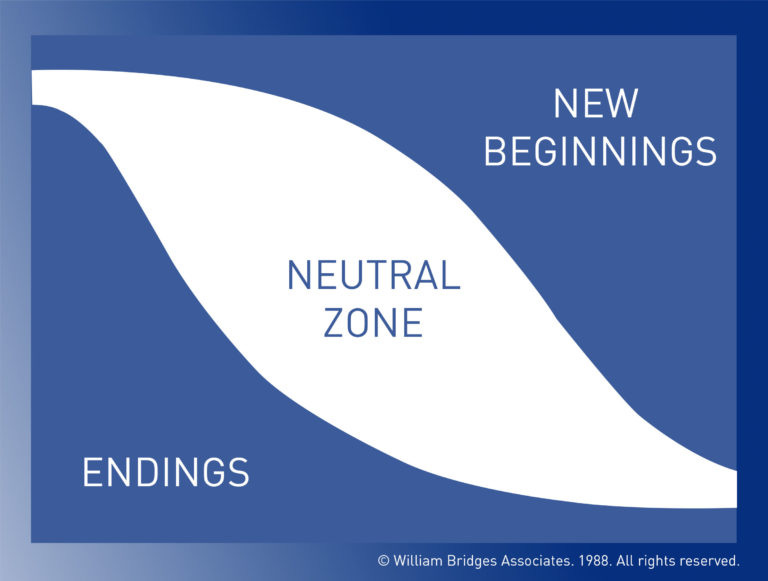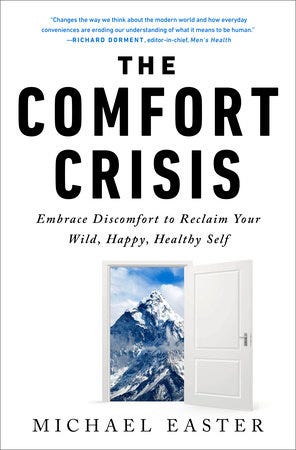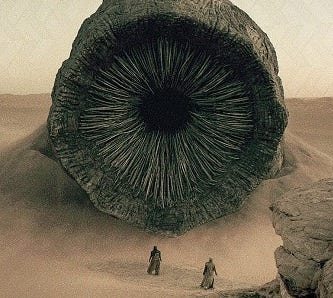Part II: We're Too Old Not to Recognize These Feelings: Here's How to Deal With Them
Old for This Sh*t: How to Take Your Life Back from an Ageist Society
Transitions Stage II: The Neutral Zone: Life Between the Trapezes
Dear Reader: This is part two of what is currently a two-part series, maybe, free for everyone, about how to manage the challenging emotional aspect of human change/transitions. You can find part one here.
We humans largely hate trying to live in a state of not-knowing. HATE IT HATE IT HATE IT CAN’T DEAL WITH IT. And yet it’s how we live every day, all our lives: we really have no clue. Embracing the not-knowing, learning to live with it with confidence, is mastery over the only thing we can control: how we feel about the actual conditions of our lives, not the fairy tale that “we’ve got this.” What we’ve got too often are reckless fear and anxiety. Learn to live with those, we’ve got life.
We honestly believe we exert control over our environments (we don’t), and that conceit leads to great anxiety and anger. Nature and the Powers That Be remind us without care or warning that what we want matters not a whit in the grand scheme of life.
Ask anyone who lived downstream from a dam that broke, anyone who lived in the path of a hurricane last year.
My first article addressed how change, which is what happens to us, creates a terrific cascade of emotions, which is defined as transition. While we can’t stop change, we can learn to navigate transition.
We often want assurances for safety and security, which will never be available. If you doubt this, just look at the divorce rate, after people pledged undying love forever and ever, or at least until something better comes along. Just saying,
There are 86 divorces every hour, compared to 230 marriages an hour.
So much for forever and ever, sickness and health.
Shit happens. In the face of profound, unexpected and especially unwanted change, the majority of us try very hard to stuff ourselves back into what was rather than to face what is coming. We may try to hang onto a past that we either may have lived or that aging convinces us was just so much better than right now.
Here’s a gentle example:
Frankly, I think the 80s were the best music decade. I was in my thirties by then. When I was a teenager, well, it was the Monkees. You see my point. But I digress.
I suspect that if given the option, a great many of us would crawl right back into our mother’s womb, despite her rather strongly-worded resistance to such an idea.
William Bridges, PhD, author of the pivotal book Transitions, described The Neutral Zone, the second phase of the transition process, this way:
It is the very core of the transition process. This is the time between the old reality and sense of identity and the new one. People are creating new processes and learning what their new roles will be. They are in flux and may feel confusion and distress.
In other words, it’s terribly important to enter this phase ready for more work.
Instead, we often stumble backwards into this time, wholly unprepared for the inherent uncertainty of this phase, and staring back at the doors which have already closed forever.
This is what can torpedo our ability to navigate this critically-important time:
We often romanticize a past to the extent that we want badly to get back to that time, when that time likely never existed. Ever, in fact.
One elderly mother of a dear friend who lived through World War II spoke of that time as though all the death and devastation had never happened. Why?
She had fallen in love in the late 1930s. Of course it was one of the best times of her life, set against horrific circumstances.
Her mind had edited out the ugliest parts, so those years were full of the sweetness of being wooed by her soldier.
Both my friend Melissa and I, now alone, find ourselves romanticizing certain aspects of our most recent loves. Our hearts carefully edit out the considerable shit-shows which were the reason those loves ended.
The heart loves a good story and is willing to sacrifice our overall health in order to chase fantasy.
We take that toxic person back, and the cycle of abuse repeats itself. Bet you’ve been there.
A deeply-felt part of us wants so badly to feel safe. Comfortable. We’ll suffer any kind of emotional amnesia to avoid the great and abiding discomfort of not-knowing.
For an excellent book on the terrible cost of our addiction to comfort, I strongly recommend The Comfort Crisis, by
.Here’s one of my favorite quotes:
“But when you understand that nothing is permanent you cannot help but follow a better, happier path,” he said. “It calms your mind. You tend not to get overly excited, angry, or critical. With this principle people interact with others and it improves their relationships. They become more grateful and gratuitous.”
I absolutely understand the desire for comfort. More than you might know.
I want SAFETY. I have gone through years of hoarding ridiculous stuff because at some deeply elemental level I believed that my stash of (name my latest, be it food or clothing or adventure gear) would offer me comfort. Having suffered incest and rapes, an elemental part of me sees the entire world as threatening. Believe me, I get this desire. But I’ve also shoved myself out of airplanes, off cliffs, up huge mountains, onto spicy horses over and over again to prove to myself that I can indeed deal. Demanding that I live in discomfort has absolutely built resilience.
The inbetween IS life, whether I like it or not. I’m not telling you to leap out of airplanes. Just recognize that comfort and safety aren’t always our friends.
Nothing is forever but impermanence. Nothing is guaranteed but change. That means you and I are in a constant, never-ending stew of transition.
That is anathema to a people who buy self-tying shoes and self-making beds.
Perhaps the best recent example of our own collective amnesia is during Covid. We may have understood that some things had fundamentally ended, but not exactly what. There was also a wholly unreasonable urge to do what could never be done: return to “normalcy.”
Normalcy implies safety and predictability, two things that are impossible in a living universe. This is the fairy tale that gets us in such terrible trouble.
Our wholesale inability to wait until we knew more about Covid resulted in a great schism between vaccinated and un-vaccinated, masking and un-masked, belief in science or not. There is no going back after those profound and massive seismic shifts in society. There is no normal after that.
In this sense, “normalcy” is as real as Never Never Land. We simply could not be with ourselves in our homes, quietly, and deal. We are at a point where we cannot sit with our own thoughts in silence, allow ourselves to be bored, (which is a gift these days) without tearing the country apart.
From Time:
Research has shown that minds are difficult to control, however, and it may be particularly hard to steer our thoughts in pleasant directions and keep them there. This may be why many people seek to gain better control of their thoughts with meditation and other techniques, with clear benefits. Without such training, people prefer doing to thinking, even if what they are doing is so unpleasant that they would normally pay to avoid it. The untutored mind does not like to be alone with itself.
There is no such thing as “normal.” Please see this by the talented . The false belief that at any point there was a “normal” is a dangerous fairy tale.
To navigate The Neutral Zone, we need a tutored mind.
Change is situational. Transition, on the other hand, is psychological. It is not those events, but rather the inner reorientation and self-redefinition that you have to go through in order to incorporate any of those changes into your life. Without a transition, a change is just a rearrangement of the furniture. Unless transition happens, the change won’t work, because it doesn’t “take.”
William Bridges, PhD
Success in moving through the second phase of Transitions is based on dealing with reality. Not trying hang onto a way of life which has died, or trying to return to what never was.
What happens when we can’t deal with endings, when we just can’t deal?
Terrified people anesthetize themselves in one way or another, through booze, drugs, distractions, radical belief systems or some other coping mechanism, anything to avoid sitting with their thoughts and dealing with losses, transitions and life as it actually is: full of not-knowing.
Denial is a form of anesthesia in and of itself, an utter refusal to see what is, like Miss Havisham of Great Expectations.
Here’s a little gift: Whatever you’re feeling, it’s normal. Resentment, fear, anger, terror, anxiety, doesn’t matter. Whatever shows up on your emotional radar is absolutely normal. Don’t anesthetize what you’re feeling.
You are supposed to feel those feels. That is part of what allows you to move through these times with confidence.

This wonderful statement is from
I just bought a one-way ticket out of my hometown. It’s funny, as you continue on the path of change, even when you know you’re taking the proper steps, you start clinging to the familiar. I know I’m miserable here, yet here I am, crying because I’m leaving a place I’ve never loved. Shout out to me for doing it scared.
Bravo, Briana. This is what life looks like when it’s working. You’re about to step into The Neutral Zone ( cue sound track from The Twilight Zone).
Yet while The Neutral Zone can be terribly frightening, it’s also the very best times to explore, experiment and evolve. In fact, there is no better time.
Those people who have done the work of naming their losses and allowing time to grieve, however, are better prepared to live in the not-knowing. They are likely still feeling horrible but they step right into this stage anyway. They are willing to ride the waves of emotions and see where it takes them.
If you want to ride life with mastery, you must risk.
Shout out to me for doing it scared.
-Briana Rynée
The Neutral Zone is full of risks, but the rewards are enormous. That’s what Transitions teach us. Are there strategies? You bet.
We have no guarantee of a safety net (never did), and we’re now hung out there for an unknown period of time. For some folks, this sounds like heaven.
The above is from the Atacama Desert in Chile. It’s a massive expanse of endless nothingness, yet teeming with often invisible life. I rode that desert for nine days in 2022. It’s an extraordinary place, used as a Mars background for movies. It’s a lot like Dune.
Like Dune, in effect, the first impression is completely wrong. This desert, the most ancient place on earth is teeming with life.
That’s The Neutral Zone to a T.
After a big change, the typical familiar markers are gone.
You enter this place- like the inside of your brain pan- and it feels empty. You live in a new town, you lost your job, your relationship ended. Our life feels scoured of what made it our life.
Truth, we’ve been filling our lives so full of entertainment for so long that we believe it’s empty. The human mind is this unbelievable expanse of wonder, ideas, joy, sorrows, adventure….a whole Universe to explore.
Yet we’ve gotten addicted to external stimuli. In doing so we stopped trusting the superpowers we already have, available in the quiet reaches of a mind trained to stop creating, exploring, risking.
This is what sudden change can give us: access to that treasure trove.
When faced with the not-knowing, we are immediately freed of a great many rules, expectations and demands. For those who need order, predictability and a sense of that aforementioned normalcy, as above, The Neutral Zone is understandably a difficult if not untenably anxious place.
Adventure awaits the traveler who knows that there are no guarantees, that nobody knows how long it will take, that this is, in effect, all of Life. Learning to be in The Neutral Zone is learning to be in life in full.
To be willing to exist in not-knowing.
For those who want to “ride the worm,” as it were, here are a few strategies:
Establish daily goals. Rather than try to plan big, focus on small steps that you can accomplish today.
Sit with a quiet mind. Stop or at least limit social media, scrolling and screen time. Live inside your incredible, unique brain. Practice being instead of constant doing.
Clarify what’s different now. Rather than try to reverse course, ask what you need now in the new circumstances.
Manage the impulse to isolate. Reaching out to people is more important than ever before. Create new communities, make new friends. Do NOT use that time to complain. Use it to brainstorm, laugh, be creative.
Create room to navigate your emotions. They will rise, and they can be terrifying. Let them come in waves, ride them instead of hide from them. Grief returns, so let it. It’s natural, normal and to be expected.
Allow yourself to be bored. In the midst of boredom is the core of creativity. The mind at utter rest is still very, very busy. When you default to social media, you are in your own way. Let your mind wander, sit by a brook, give it permission to explore.
Try new things. There is no better time to experiment than right now. The stakes are different, the benefits are considerable. Learn a new skill. Go to new places. Travel, move, whatever it takes, but allow yourself to see, feel and experience new things.
Keep your options open. The temptation to return to what we know is extreme. All too often we spend so much time trying to be what we were, we lose the chance to become something so much better.
Keep a journal. It’s a great way to grow and be able to track your growth.
Find reasons to laugh. There is no faster access to creative thought than through humor.
I push myself during Neutral Zone periods to do radically different things. That’s where I am right now, watching for my Grandfather worm in the distance.
I like it here. I have options. I have just extended my maker hooks.
This Dune analogy appeals because life is full of myth. If you and I want a life story worth telling, if we want to be that mythical figure in our own lives instead of watching other people live theirs, please read what Frank Herbert had to say:
The elements of any mythology must grow from something profoundly moving, something which threatens to overwhelm any consciousness which tries to confront the primal mystery. Yet, after the primal confrontation, the roots of this threat must appear as familiar and necessary as your own flesh. For this, I give you the sandworms of Dune ... the extension of human lifespan cannot be an unmitigated blessing. Every such acquisition requires a new consciousness. And a new consciousness assumes that you will confront dangerous unknowns—you will go into the deeps.
— Frank Herbert, 1977
The deeps are The Neutral Zone. Every mythical hero must traverse theirs.
These are terrifying times. How will you ride them?
One way is running and hiding. Another is to immerse yourself in fear and anger and attacks.
I suggest you be more like
: feel the fear and buy the damn one-way ticket anyway.Let’s play.
Thank you as always for reading my material. I may do a part three but I need to walk my pupper and go look for wormsign. My maker hooks are in the backpack….
Please consider, and adventure well:
Bolded quotes are this author’s.










Thank you, Julia! This was what I needed: I love the practical steps. I’m considering sharing them with my daughters at college, because they also seem like practical steps out of anxiety at many ages. I have already said “yes!” to two meet ups in the country I’m moving to in 2 weeks. Onwards!
Thank you for these incredible insights, wow.